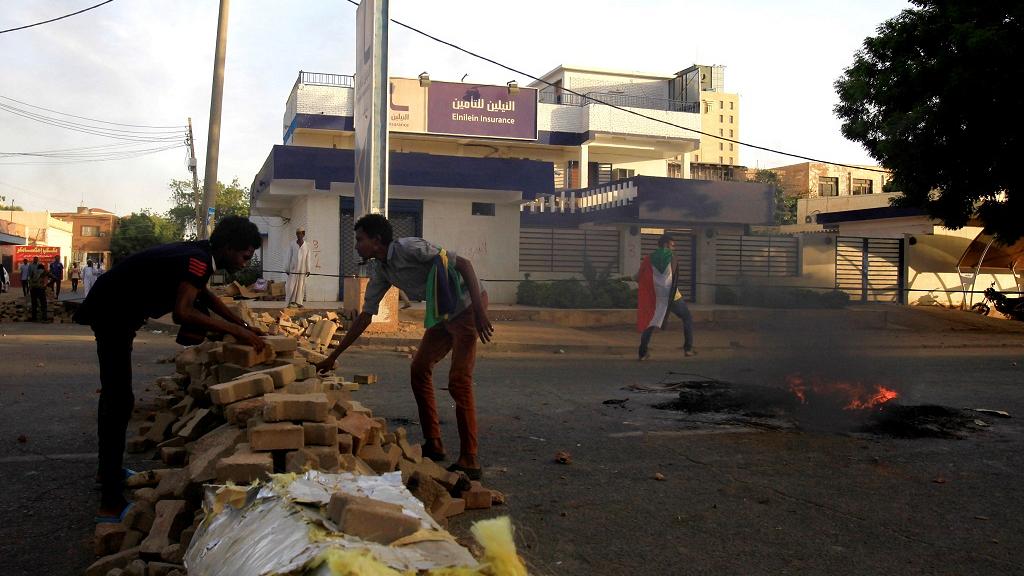
BY AFRICANEWS
The removal of roadblocks in parts of the Sudanese capital, Khartoum, has started according to multiple reports.
The many roadblocks that had crippled movement across Khartoum led to the suspension of civilian-led transition talks between the military junta and protest leaders.
The military said it had suspended the talks for 72 hours effective Thursday morning. The protest leaders hit back at the move describing it as a surprise tactic by the military.
Meanwhile, a group of United States Senators have reiterated a call for America to stand with the Sudanese people in their fight to achieve a democratic country.
In a May 16 letter to the U.S. Secretary of State and Secretary of the Treasury, the 92 bipartisan lawmakers said: “This is a critical moment for Sudan, one that came about because of the Sudanese people took to the streets to demand it.
“It is also critical for the United States to support Sudanese citizen’s demands for real democratic change.” The protests that started since December 2018 has led to the ouster and arrest of long serving Omar al-Bashir.
May 16, 2019: Roadblock removal blocks transition talksDays after the military and protest leaders agreed on a deal to lead Sudan out of a post-Bashir political flux, there is a new headache in the form of mounted roadblocks.
- Chamisa under fire over US$120K donation
- Mavhunga puts DeMbare into Chibuku quarterfinals
- Pension funds bet on Cabora Bassa oilfields
- Councils defy govt fire tender directive
Keep Reading
The Transitional Military Council, TMC, is calling for all roadblocks particularly in a designated area in the capital to be removed.
The measure had been one of the effective means that protesters have used in pressing for their demands. Vehicular movement has been largely restricted due to the roadblocks.
Protesters have also camped around these roadblocks as part of a sit-in around the premises of the military headquarters. Attempts to forcibly remove the roadblocks have failed despite claiming lives of some protesters and a security official.
The two parties have agreed for a three-year transition period to a civilian administration. The opposition alliance would have two-thirds of the seats on a legislative council. The sticking point is about who gets what number of seats on the sovereign council.
May 15, 2019: South Sudan president comments on crisisThe military junta that deposed Omar al-Bashir have agreed a deal transition deal with the opposition alliance. This follows weeks of back and forth over post-Bashir Sudan.
How long: The two parties have agreed for a three-year transition period to a civilian administration.
Legislative make up: The Transitional Military Council (TMC) disclosed that the alliance would have two-thirds of the seats on a legislative council.
Sticking point: the configuration of a sovereign council is what remains outstanding. The military and civilians have disagreed on who gets majority of seats on the council.
The last time the military made concessions on the issue, they said the best they could do was to allow for equal representation.
May 14, 2019: South Sudan president comments on crisisPresident Salva Kiir of South Sudan has asked that the sovereignty of Sudan be respected in this time of political uncertainty as the country works towards a transition.
“It is important to remind international and regional actors not to interfere in Sudan. The people of Sudan are perfectly capable of managing their own affairs. Let us prove the world wrong.
“We are not war mongers, we are peace loving people and we are a proud and dignified nation,” he said on Tuesday during the opening of the second session of the South Sudan parliament in Juba.
Meanwhile, over in Sudan, post-Bashir flux continues. Transition deadlock between the junta that ousted Bashir and protest leaders is reportedly making headway.
The Khartoum sit-ins that have crippled movement in key areas of the capital continues. Reports indicate that in the second city Omdurman, protesters have blocked roads after deadly clashes on Monday in Khartoum.
May 13, 2019: Sudan’s military and opposition agree on power structureSudan’s military council and opposition groups have agreed to a power structure for the country’s transition but have yet to decide how long it will last or the make-up of transitional bodies, the council’s spokesman said on Monday (May 13).
Protesters are pushing for a civilian-led transition and have kept up demonstrations against the council since military officers removed Bashir, who is now facing multiple criminal investigations, from power.
On Monday they blocked roads in central Khartoum in an escalation of tactics after security forces used tear gas to disperse dozens of protesters across the Nile in Khartoum North, Reuters witnesses said.
On day two demonstrators blocked Nile Street, a major avenue running south of the Blue Nile, placing burning branches and stones across the road.
The military-civilian balance of power and the length of the transition have been key sticking points in talks between the council and an alliance of protest and opposition groups since former President Omar al-Bashir was ousted on April 11.
REUTERS











